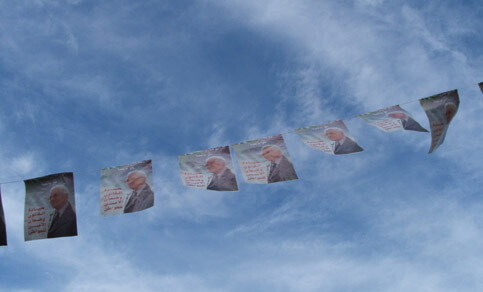Khan Younis, Palestine 8 January 2005

Election posters (Photo: Maureen Clare Murphy)
The streets of Khan Yunis look like any other main street in an average sized Palestinian town in the days before the election. Posters, grafitti and flyers fill the streets with the names of the candidates for the first presidential elections since 1996. Grafitti artists seem to be more in favour of “Abu Mazen”, while advertisers prefer the large boards with the picture of Mustafa Barghouti shaking hands with Gaza’s elder statesman Haider Abdel Shafi.
“I don’t trust them,” a young resident of Khan Yunis refugee camp told me. “We have seen Abu Mazen being stuck between Abu Ammar and Sharon last year.” A supporter of the resistance movement said he was not going to vote, because he believed “both of them commit themselves to end the Intifada”. Another resident of the camp said he was voting for Mustafa Barghouti because he believes Barghouti will bring change. The Abu Mazen supporter did not agree with him. “Barghouti is flirting with Hamas,” he said, “have you ever seen a communist pray?” He referred to Barghouti’s attempts to pray in the Aqsa mosque in Jerusalem.
“Abu Mazen reluctantly agreed to become prime minister,” the Barghouti supporter said, “he signed the road map for peace and then quit after four months.” Mahmoud Abbas accused Arafat of undermining his authority by refusing to give him control of the Palestinian Authority’s security organizations. “Arafat kicked him out,” he said, “and now he appears of the posters with Abu Ammar.”
This morning, we heard that Israeli soldiers killed a 61-year-old Palestinian police officer at the Matahen checkpoint, north of Khan Yunis. He was waiting for a taxi to transport him to his work in Nusseirat refugee camp. Israeli soldiers in a military post near the checkpoint opened fire at Palestinians and their vehicles when they were waiting to cross the checkpoint.
Immediately Israeli forces closed down the checkpoint. Eyewitnesses reported that the area was quiet when the shooting took place. It is not the first time Israeli forces open fire on commuters and their cars while crossing that checkpoint.
From Khan Yunis we drove to Muwasi, located between the sea and the Gush Katif settlement block. In this corner of the Gaza Strip some 6,000 Palestinians live completely cut off from the outside world. Muwasi is a tiny strip of land, one kilometer deep and 14 kilometers long. However residents refer to Muwasi as a prison.
Hundreds of residents wait before a massive gate, next to a huge concrete wall, separating the Gush Katif settlement bloc from Khan Yunis. They are not allowed to go any further. These residents from Muwasi want to return to their homes, but are stopped by the Israeli army. “We will try to get observers in,” a woman at the UN liaison office told me. However, human rights experts doubt that the UN will manage to convince the Israeli authorities to allow observers and residents from Muwasi to enter their strip of land.
For the residents in Muwasi the elections are about their freedom to move. Likewise, residents of villages around the West Bank city of Nablus are unable to leave their villages. Ala, a friend of mine from Nablus called me. He said that at the two main checkpoints leading into Nablus, restrictions remained unchanged. Palestinians under the age of 25 are barred from entering. There is a curfew in place in some of the villages, including Beita.
On the eve of the elections, Palestinians in Gaza seem to be hopeful about the electoral process, but not about their future. They fear a massive Israeli military campaign after the elections, similar to previous incursions and assaults. “We don’t have any illusions,” a taxi driver told me. “We know that the elections will not solve our problems, but at least we can still pretend we are in a normal situation.”
Related Links
Arjan El Fassed is a co-founder of The Electronic Intifada and a member of UCP’s election mission, accredited as international election observers.



